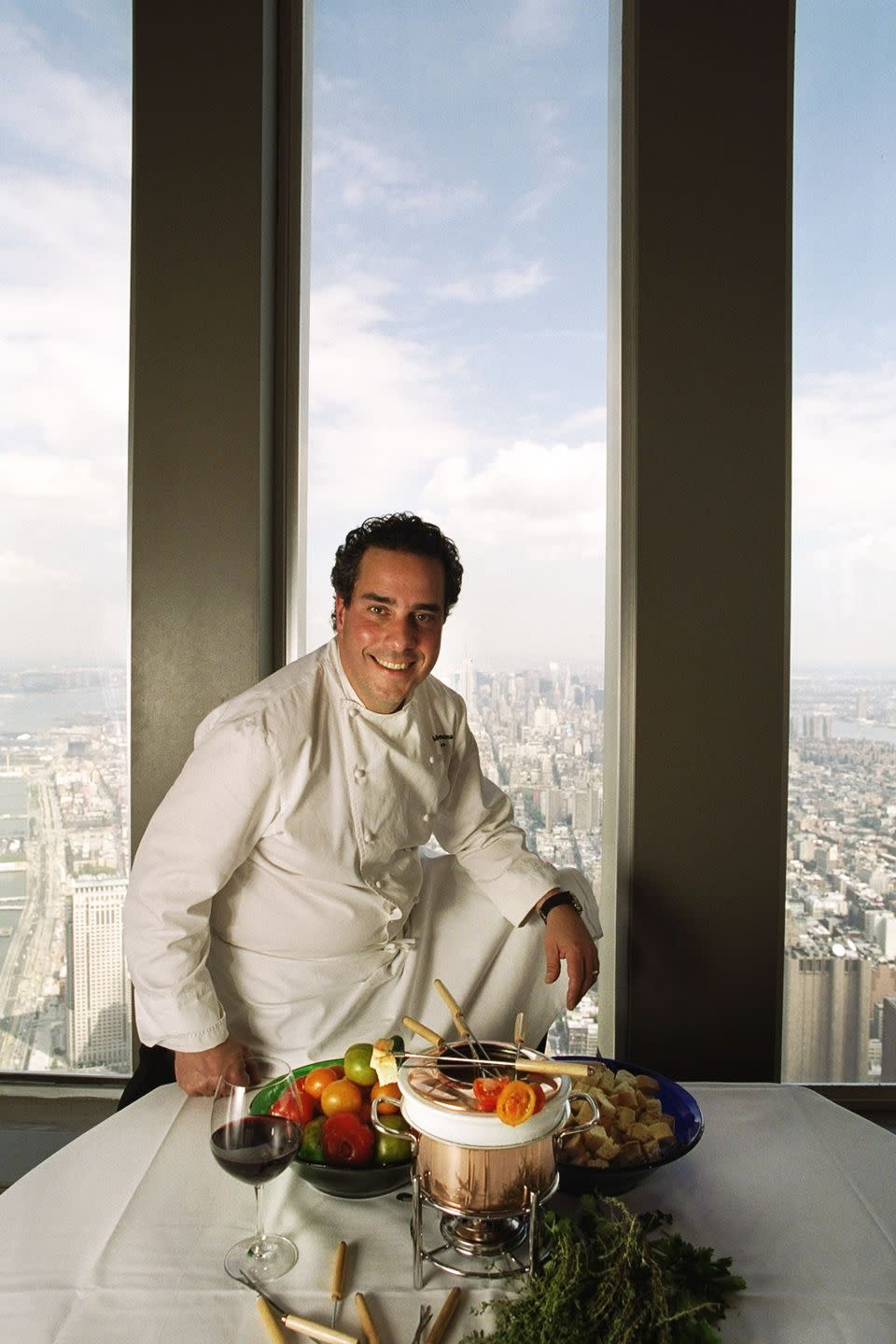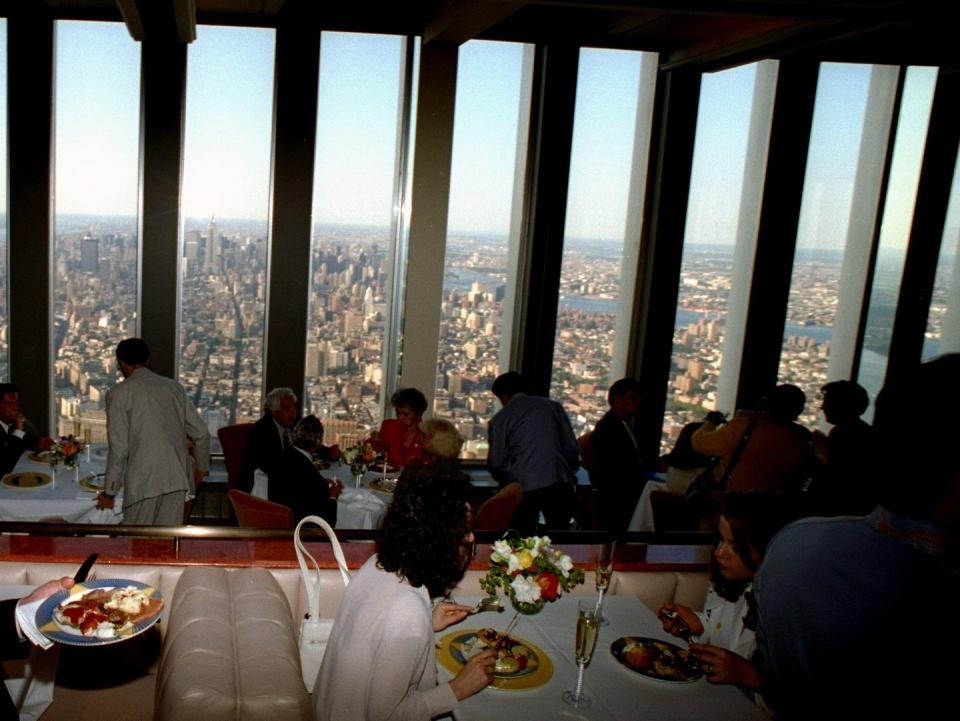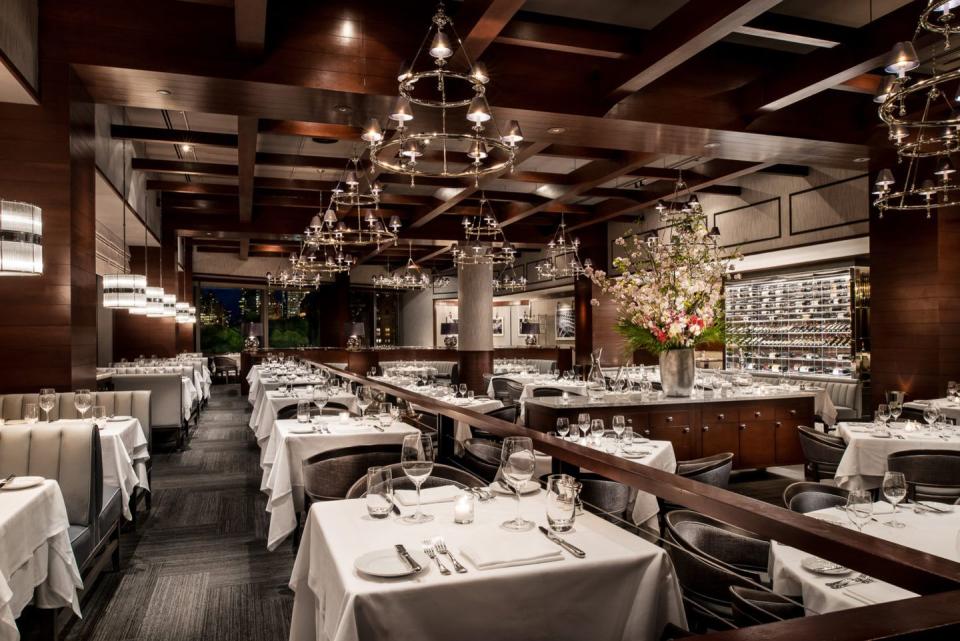Chef Michael Lomonaco Knows a Thing or Two About Starting Over
There are going to be good days ahead. This will end. I trust the scientific community to help save humanity.
Trying to think our way through these restrictions is similar, in a way, to how we had to live a new life after 9/11. We had to live a new life that made us more aware of, if you see something, say something.
The lessons that we learn in life, we sometimes don’t know they’re a lesson until we look back.
My mother was partially blind most of her life and then lost more vision as time went on. She used magnifying glasses to see everything. What I learned from my mom is that anything was possible.
I was 18 and my middle brother, Tony, had been a waiter when he was in college at a country club. And he had told me about duck a l’orange. There was no Google, so you had to go to a library. I went to the library, and I looked up duck a l’orange. And from scratch, I made a duck a l’orange in my parents’ house. That was the first meal I cooked where I amazed myself.
Ambition is a funny thing. Ambitious sounds derogatory. Ambition. We use it, in a way. But being goal-oriented is not bad. I was ambitious to be the best chef that I could be.
I went to school in the day and I worked at night in an Italian restaurant that at the time had ninety-seven years under its belt. It was a sort of a legendary Brooklyn restaurant called Monte's Venetian Room. It taught me speed. It taught me efficiency of work, economy of motion.
You set goalposts for yourself and then you get to one. Now you need to move the goalposts further and then imagine what the next challenge is. Pragmatism is a good skill to practice.

When Phillipe Petit walked the wire between the World Trade Center towers, the photos were on the cover of the Daily News and the Post and the Times. I was a photographer. I'm still a photographer. Images stay in my head. It's amazing what he did, because that's someone who every day puts one foot in front of the other. Trusts his skill to get him to the other side.
My first elevator ride at the World Trade Center, halfway up I started to say the Hail Mary. I did that every day for four years.
I was amazed as I got close to the windows. I looked west and I could see Newark Airport and planes taking off. It was mesmerizing. It was a beautiful, clear day. And you could see for miles, miles and miles. This became a metaphor for the kind of food I thought we should cook there.
When you write a menu, you should write a treatment, like you would for a movie script. Describe the action, describe the setting, the characters.
On the morning of September 11, I went to work as I usually do—but I didn't get in the elevator. I'm an early bird and a night owl at the same time—for a chef, every day is a long day. So I arrived at eight o'clock in the morning and I felt I had time to go and get my reading glasses adjusted. I'd had a damaged lens and there was a LensCrafter shop right there in the concourse level of the World Trade Center. They said, “We can get you new glasses by the afternoon.” I was seated in an examining room. I put my glasses on the table. I was there for a little while, and the doctor was almost finished with me when I felt something rumble. Now behind me where I was seated, I knew there were subway trains. But I thought, that can't be the subway. And in fact it was the impact of the first plane that I felt. It shook the whole building. And it was moments later, the lights went out, and within a minute or two they were evacuating the Concourse level.

Liberty Street had the firehouse, Number 10. They had their trucks out on the street and everyone was looking up, and debris was falling from the sky. It was a beautiful day, crystal clear, blue-sky day, but the sky was filling with smoke. Some of the debris was probably from the fuselage, and papers were flying, littering like confetti. I went to use my cell phone, it didn't work. So I went to find a pay phone. I was able to call my wife and I said, “I don't know what happened.” But I had to look back up at the building and I saw the smoke that was coming from Tower One, where Windows on the World was. I started to call people, but the cell phones were useless. Someone said to me, “A plane hit the World Trade Center.” Now from my office, I used to see planes taking off from Newark all the time. I couldn't imagine how this could happen—I imagined it was some accidental pilot error. I just couldn't imagine how that could happen.
I was in the street when the second plane hit Tower Two. I could hear that plane coming in, and I looked up and saw the fireball of the impact. I mean I was just beneath it, a block or two east of the tower. I went through a list of the schedule in my head of who’s actually up there at 8:43 in the morning—who was working?
It took months to identify all the people we lost that morning.

The stress and anxiety, the loss, the pain—all are multiplied by the financial losses that all of these workers, all of these people are going through right now. The similarity now is so much like it was for a period of time after 9/11 and the economy did not really restart in a vibrant way for a while after 9/11. It didn't come roaring back. People were hesitant to spend money to go places and do things.
We have so many more tools today. The internet, and the ability to speak to each other. Fundraising. There are just more people who've had experiences after Katrina trying to help that community, after Houston's floods and trying to help that community. The world has grown more sophisticated in how to deal with tragedy and how to deal with the hardship that everyone is enduring right now.
We have to believe that the future is ours because otherwise it paralyzes us in the here and now. And I can never be paralyzed.
Keep moving ahead. It took me years of work after 9/11 to get to the place that I am now.
You know what we're doing now? I have some key staff working with me through FaceTime and conference calls, and we're planning the re-opening of the restaurant. What will the menu be? How many people will it take to produce this menu in the first week? What will it take in the second week as business starts to return, in week three, and month two we're planning. That is what we're focused on now.
The sun will shine, baby.
You Might Also Like

